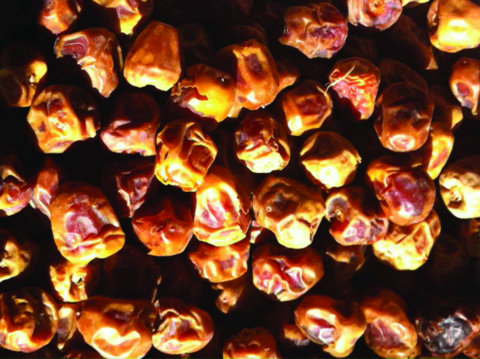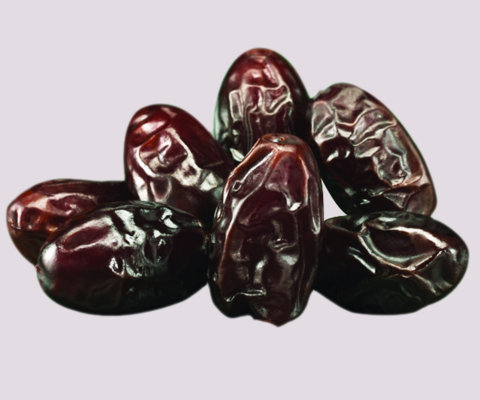For centuries, dates have been prized for their health-enhancing benefits. Greek physicians, ancient Egyptians and Islamic scholars used dates in folk medicine to cure a plethora of ailments – from digestive disorders, bronchial problems, blood pressure regulation, liver ailments, tumours and even fertility issues.
For thousands of years, dates have been a staple food in the Middle East, especially during the Holy Month of Ramadan, when Muslims eat dates to break their fast just as Prophet Mohammed (PBUH) did.
 In Qatar, the demand for dates peaks as Ramadan approaches, though you can find a huge variety of dates and date products for purchase throughout the year. Qatar produces around 31,180 tonnes of dates a year from a total of 649,616 palm trees spread across different farms in the country and imports some 4,369 tonnes annually. In fact, the country has achieved 88.4% self-sufficiency in terms of the availability of dates in the local market.
In Qatar, the demand for dates peaks as Ramadan approaches, though you can find a huge variety of dates and date products for purchase throughout the year. Qatar produces around 31,180 tonnes of dates a year from a total of 649,616 palm trees spread across different farms in the country and imports some 4,369 tonnes annually. In fact, the country has achieved 88.4% self-sufficiency in terms of the availability of dates in the local market.
The developmental cycle of a date
The development cycle of the date fruit is divided into five distinct stages:
- Habakuk: Development of a small white fruit after a week of pollination.
- Kimri: At about five to 17 weeks there is a visible change of colour and size. The fruit is small and green and slowly turns yellow and red.
- Khalal: In 18–25 weeks, the fruit grows longer and turns either fully yellow or red. The fruits are quite hard but can be consumed.
- Rutab: The fruit ripens in another five to seven weeks, turns brown in colour and is nearly ready to be harvested.
- Tamr: Three weeks post the rutab stage, the ripened fruit is harvested.
What’s in a Date?
Science revealed that this humble fruit contains a remarkable line-up of essential vitamins and minerals:
Dates contain Vitamin A and numerous B-complex vitamins – thiamin, riboflavin, niacin, vitamin B6 and pantothenic acid – all of which are necessary for healthy body tissue and muscle.

They are fat-free, cholesterol-free and sodium-free.
Dates also contain 15 minerals including magnesium, iron, phosphorous, copper, calcium, manganese and potassium, all of which are essential for the proper functioning of muscles and the nervous system.
A single date contains more potassium per gram than a banana!
Dates are loaded with dietary fibre, both soluble and insoluble, which helps to reduce the risk of certain cancers and control blood sugar levels.
Despite its high level of sweetness, a single date only has 23 calories.
The date fruit has antioxidant flavonoids such as beta-carotene, lutein, zeaxanthin and tannins. These anti-oxidants possess anti-inflammatory, anti-haemorrhagic and anti-cancer properties.
Healing Properties and Islam
The age-old adage says ‘an apple a day keeps the doctor away’. In the Arab world, this can be adapted to ‘seven dates a day keeps the doctor away.’
Prophet Mohammed (PBUH) uses the number seven, which has religious significance in Islam. Here an interesting fact emerges – seven dates weigh approximately 100 grams and by today’s standards, this is the perfect serving size to replenish the body with the required amount of daily vitamins and minerals!
What is referred to as ‘poison’ in the referred hadith could be toxins in the body, and 100 grams of dates has a sufficient amount of nutrition to eliminate these accumulated toxins.
In effect, this hadith advocates the consumption of dates on a daily basis to promote overall well-being – promoting a healthy body, which results in a healthy and happy mind.
Dates and the Holy Month
A date is very dense in essential nutrients and even a small serving can easily satiate hunger.
Dates are also an excellent source of fibre, sugar, magnesium, and potassium, and have carbohydrates that aid the body and help it recuperate after the fast from sunrise to sunset. Additionally, the carbohydrates found in dates make the fruit a slower-digesting food, which provides sustenance for longer.
To Muslims around the world, dates are an integral component of meal time throughout the Holy Month of Ramadan. They are essential on the Iftar (the meal at sunset to break the fast) table.
Through Ramadan, Prophet Mohammed (PBUH) is said to have broken his fast with fresh dates. If dates were not available, he made do with a glass of water before he performed Maghrib (the evening prayer).
Popular date varieties in Qatar
When in Qatar you’ll find an abundance of dates for purchase. In fact, the Ministry of Commerce and Industry (MOCI) says there are around 100 varieties of dates with distinct shapes, tastes and names available.
Some of the top varieties are:
Ajwa: Ajwa dates are the most popular variety of dates among Muslims. They are melt-in-the-mouth soft and fruity, quite dark in colour and tend to be wrinkled but not flaky.
Emphasis is given to eating Ajwa dates in the Quran and in hadiths for the health of one’s mind and body, which has added to their popularity. This variety is cultivated in Madina, Saudi Arabia and is often the most expensive variety of dates in the market.
Medjool: These dates are some of the most popular the world over, and are known as the ‘Queen of Dates’. They are well known for their large size, soft texture and rich ‘date’ flavour. This variety is also more expensive on the date spectrum, often only second to the Ajwa. They are great for shakes, smoothies and other sweet treats.
Khenaizi: These dates are soft, small to medium-sized and average in sweetness. Khenaizi dates are dark brown and have a juicy texture. This variety can be enjoyed even before the fruit is fully dried. These dates are grown in the Middle East.
Segai: Segai dates are light brown and fade to yellow at the tip. These dates are somewhat crisp, with dry skin and are mildly sweet. They are wrinkled but don’t flake.
Mabroom: These dates have a slender, longer and firmer body when compared to other varieties. They are more subtly flavoured and are moderately sweet. Mabroom are wrinkled but do not flake.
Sukkary: Sukkary dates have yellowish-brown skin and are sweet. Generally soft and chewy, a crystallised layer often forms on the outer layer, offering a crisp bite. The crispness and sweetness are what give them their name. They have a mild ‘date’ flavour.
Safawi: Safawi dates are soft and sweet, their colour varies from dark brown to black. These dark dates are fleshy and packed with vitamins. It is said that if eaten on an empty stomach, Safawi will kill stomach worms. They are wrinkly, but the intensity varies between individual fruit – a more wrinkled fruit being more chewy.
Fard: The Fard variety of dates is small and roundish, with tender skin and a small seed. They are usually reddish and light brown. A unique characteristic of these dates is its naturally smooth, glossy and waxy covering.
Where to Use Dates
Dates make a sweet, nutritional snack and can be eaten raw. They can also be glazed and eaten with syrup. To add a delicious twist, they can be pitted and stuffed with a number of fillings, with nuts probably being the most popular – walnuts, almonds, cashew, pistachios, and pecans. Other fillings include candied orange or lemon peel, tahini, marzipan and even cream cheese!
Dates are so versatile that different countries found their own novel uses for date fruit.
In Qatar for example, they are used in a variety of puddings and biscuits, for example, the ever-popular Date Maamoul, and other desserts. Dates act as a natural binding agent in baked treats. Date syrup is added to beverages as a natural sweetener, or to desserts for an extra flavour boost.
Over the last few years chocolate-covered dates have become popular – as an exotic dessert or as a gift box, be it a hostess gift or something expats take back home for friends and family.
Tips on buying dates in Qatar
MOCI offered consumers advice on what to keep in mind when buying dates. Here’s what you need to know:
- Dates must not have a foul smell and be free from insects, both in the interior and on the exterior
- Ensure that the fruit is free of holes, and look out for signs of age, such as an unusual smell or taste
- Selected dates should be from the harvest of the same year of purchase
- Avoid buying dates that are kept out in the open, and exposed to dust and pollutants
MOCI also instructed salespersons and vendors to abide by its regulations – such as issuing detailed invoices, posting price tags and detailed information labels for products on display, and avoiding the levy of any fees on transactions conducted through debit or credit cards.
Similarly, consumers should also insist on getting an invoice for their purchases and check the dates before buying.
Copyright © Marhaba Information Guide. Reproduction of material from Marhaba Information Guide’s book or website without written permission is strictly prohibited. Using Marhaba Information Guide’s material without authorisation constitutes plagiarism as well as copyright infringement.










